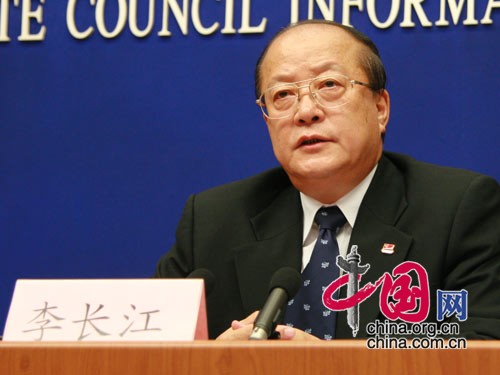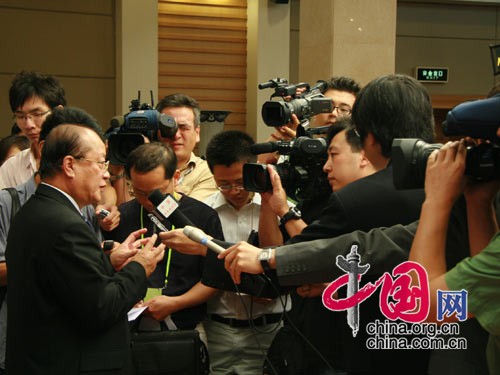| Home / Government | Tools: Save | Print | E-mail | Most Read |
| Inferior Food Exporters Punished |
| Adjust font size: |
The country's top watchdog on quality announced on Friday punishments for three companies for exporting substandard products, but said three other alleged unsafe Chinese products -- tires, ceramic cooking pots and candies -- were up to standard. Authorities have revoked the business licenses of two companies that exported wheat protein tainted with toxic chemicals. They have been banned from exporting and importing, according to the General Administration of Quality Supervision, Inspection and Quarantine (AQSIQ). The two companies had "unlawfully added melamine in some of its protein products exported to the US," AQSIQ Minister Li Changjiang said at a State Council Information Office press conference. The tainted wheat gluten was reportedly found in food for dogs and cats in North America.
Li said that the companies had managed to evade quality inspection by labeling their products as chemical ingredients, which are not subject to compulsory inspection. The administration has also closed down the factory of another Chinese manufacturer involved in a drug poisoning incident in Panama. The business license of the Glycerin Factory of Taixing in Jiangsu Province has also been revoked. The government said on May 31, that the factory mislabeled the industrial use of glycerin, but said a Panamanian trading firm was also culpable because it changed the scope of use and shelf life of the product. Li also defended a producer of tires the US had recalled for allegedly being unsafe, a firm that produced ceramic cooking pots Japan claimed contained lead, and a candy maker whose products were allegedly found to contain formaldehyde in the Philippines. "Our investigations and tests found no problems with these products," he said, adding that the US and Japanese sides had confirmed that the tires and pots were up to standard while the Philippines would not offer relevant data on the candies tested. Li stressed that his agency attached great importance to the safety of Chinese products and was working responsibly to address concerns over recent food safety issues. "I think the great majority of Chinese food products are safe," he said. "But we shall also squarely face the problems and enhance supervision over small food processing plants whose products are sometimes substandard." The minister said food safety was not only China's concern, but also the common responsibility of all countries. "We shall intensify international cooperation as well," he said. He said China will meet the US at the end of the month to discuss a block of its seafood exports and a memorandum of understanding on food safety. A vice-minister-level meeting has also been scheduled for next month to discuss details in the memorandum.
US urged to treat Chinese imports fairly The Chinese Embassy in Washington has urged the US to treat China's food and drug exports in a scientific and fair manner, saying exaggeration and complication of the issue is not conducive to the healthy development of bilateral trade. The embassy issued a statement on Thursday after a series of disputes over the quality of products between the two. The embassy said it hoped the US would not exaggerate or play up individual food safety cases and create a "China food and drug threat", giving the American public the wrong impression. "Blowing up, complicating or politicizing the issue is irresponsible," it said. It added that it is even more unacceptable for some to launch groundless attacks against China using the food and drug safety issue as an excuse. It said problematic US imports from China such as toxic ingredients mixed into pet food were isolated cases and more than 99 percent of Chinese food that is exported to more than 200 countries and regions met the safety standard. The statement said China should not be singled out for particular concern over food safety, a common challenge facing every country including the United States. Noting recent US cases of contaminated spinach, peanut butter and poultry, the statement said China is not on the top of the list of countries whose food exports were refused in the past year. It said the Chinese government has taken this matter very seriously, acted responsibly and immediately adopted forceful measures. (China Daily July 21, 2007) |
| Tools: Save | Print | E-mail | Most Read |
| Related Stories |
|
|
||||||||||||
|
| Links | |||||||||||
|


